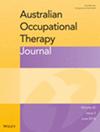Advancing occupational therapy scoping reviews: Recommendations to enhance quality and methodological rigour
Abstract
Introduction
Scoping reviews are an increasingly popular methodological approach to collate evidence and synthesise knowledge in many fields including occupational therapy. However, many are published with potential methodological weaknesses. To address this issue, nine methodological recommendations that authors could adopt to improve the quality and rigour of published scoping reviews are proposed based on the authors' opinions and the published evidence.
Overview
It is suggested that when authors are completing a scoping review, they can consider completing one or more of the following methodological guidelines: (1) refer to the Levac et al.'s (2010) scoping review recommendations, the JBI Scoping Review Protocol, and the PRISMA Extension for Scoping Reviews (PRISMA-ScR) Checklist as methodological guides; (2) include grey literature as a standard component search strategy approach; (3) include thesis and dissertations as recognised sources of evidence; (4) apply a recognised research methodology critical appraisal/quality assessment tools and scales to evidence selected for inclusion in scoping reviews; (5) assign a level of evidence (LoE) framework to the selected evidence; (6) apply a recognised qualitative knowledge syntheses approach to the data extracted; (7) report the steps taken to ensure the trustworthiness of the qualitative knowledge synthesis approach used; (8) include consumer, stakeholder and community consultation; and (9) apply a scoping review-specific critical appraisal/quality assessment tool as a quality assurance activity. The authors are not proposing that the nine recommendations are mandatory, but instead they are methodological guidelines that scoping review authors can incorporate if they choose.
Consumer and Community Involvement
Consumers and community members were not involved in the writing of the manuscript.
Conclusion
Adopting the suggested methodological recommendations as a regular part of completing occupational therapy-related scoping reviews will increase their quality, precision, and rigour.


 求助内容:
求助内容: 应助结果提醒方式:
应助结果提醒方式:


